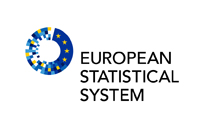
The European Statistical System (ESS) is a partnership between Eurostat (the EU Statistical Office), the National Statistical Institutes of the member states, and other national authorities responsible for the development, production and dissemination of European statistics. The primary objective of the ESS is to guarantee that European statistics, compiled in all the Member States of the European Union, are comparable, reliable, relevant and usable. Eurostat has the central function in the cooperation, and leads the work by developing statistics across country borders and ensuring the availability of harmonised European statistics of a high quality.
Eurostat does not collect statistics from respondents, but compiles and quality controls national statistics that are collected and reported by the national statistics producers. These are published on the Eurostat website. As the national statistical institute of Ireland, the CSO is an integral part of the ESS. Within the ESS framework, the CSO maintains close contact with Eurostat and the other statistical offices.
The nucleus of the ESS is the European Statistical System Committee (ESSC), which consists of the heads of Eurostat and of the national statistical institutes. The ESSC discusses and decides on issues that are pivotal to the development and production of European statistics, such as the priorities in the annual European Statistical Programme, response burden, cost effectiveness, statistical confidentiality, guidelines on statistics production etc.
ESS has its own website, which provides administrative and institutional information, including news from the national statistical institutes. Links to .
The ESS was formalised in March 2009 when the European Parliament and the Council adopted Regulation 223/2009 on European statistics which was amended in 2015 by Regulation 2015/759, see the consolidated text of amended Regulation 223/2009. Regulation 223/2009 is informally known as the EU Statistical Law. Eurostat has compiled a useful guidebook on the EU Statistical Law at Legal framework for European Statistics: The Statistical Law.
Official European statistics are regulated by the principles in the European Statistics Code of Practice, whose purpose is to ensure the quality and credibility of the data. These principles refer, among other things, to professional independence, the protection of confidentiality, the reliability of the results, their precision, timeliness, punctuality, accessibility, clarity, comparability and coherence.
The CSO undertook a peer review in February 2022. The Peer Review found that the CSO has set a clear direction set for the future of the CSO and the Irish Statistical System (ISS), the CSO has a committed workforce with a strong focus on cooperation, innovation, and a respect for statistical principles, the CSO has no compliance issues with the European Statistics Code of Practice (ES CoP) and that the CSO is widely known and trusted in society as being an independent producer of high-quality official statistics. Read the Peer Review Report Ireland 2022
and see the
The European Statistical System (ESS) is undertaking its third round of Peer Reviews in the period 2021 - 2023. During this period a Peer Review is conducted in each national statistical system of the ESS, to examine the degree of compliance with the principles in the European Statistics Code of Practice (ES CoP). The reviews are conducted by international experts appointed by Eurostat. CSO Ireland also provides experts to sit on the Peer Review panel of experts for other Member States Peer Review process. The CSO Peer Review took place in February 2022.
The peer review reports for other Member States are available on the Eurostat website.
Links to the National Statistical Institutes of the EU can be found at Eurostat National Statistical Offices.
Apart from the national institutes, other national authorities are involved in the production of European statistics. In Ireland, these are: